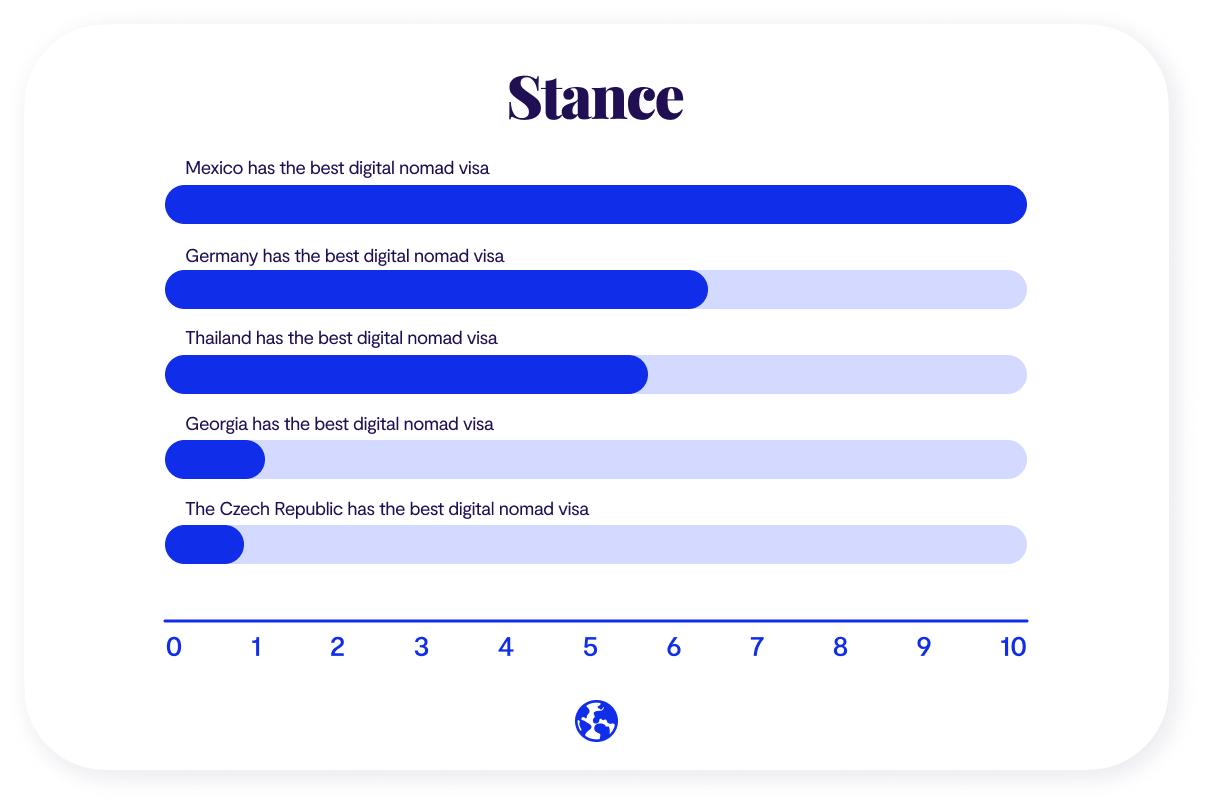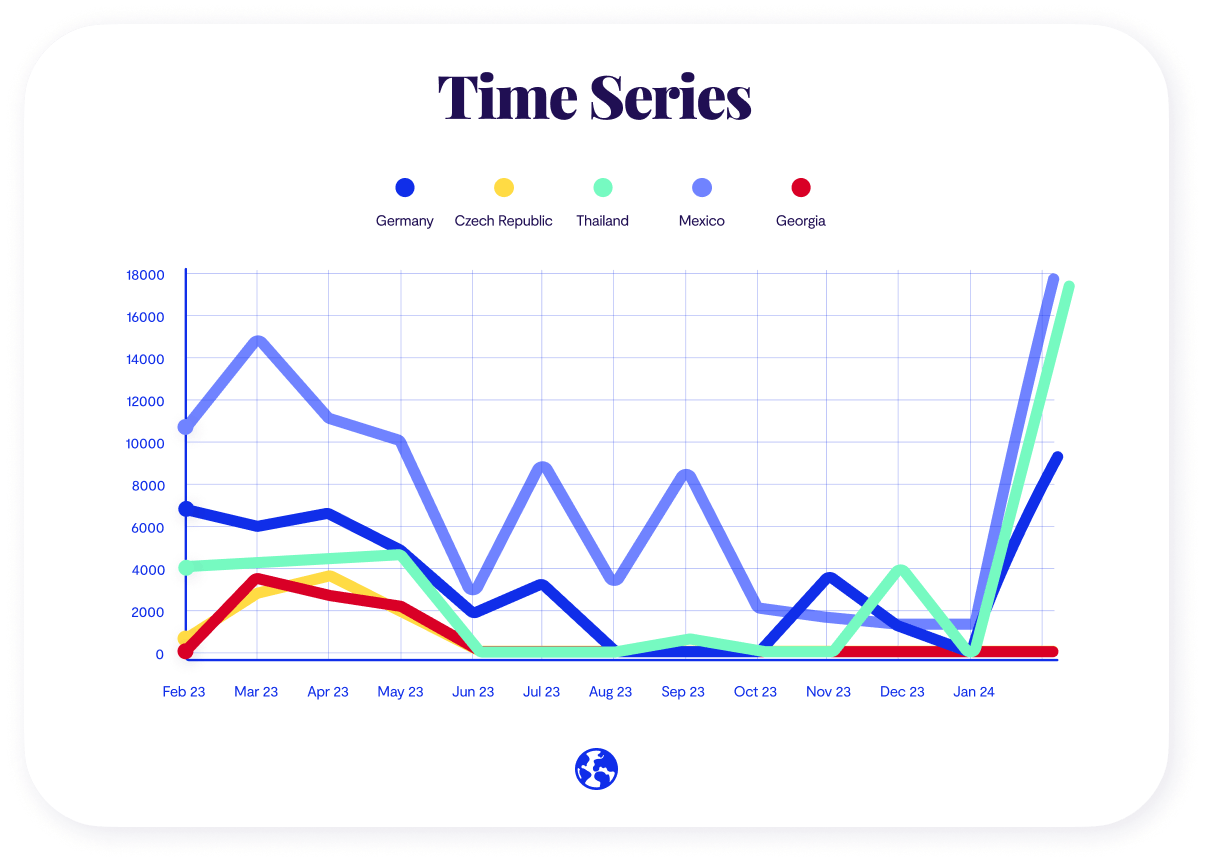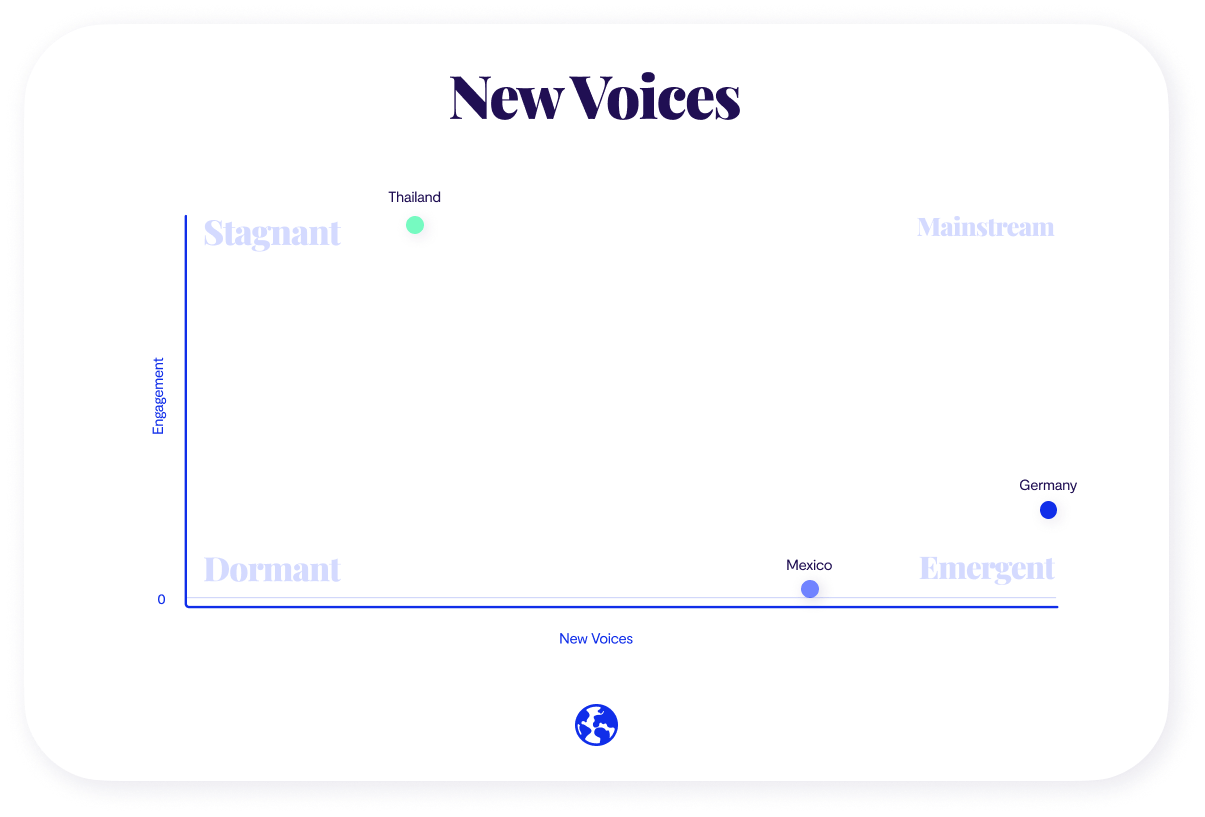2023 Digital nomad demographics
Let’s start with some basic demographics. Who are the people that make up such a vast portion of global workers today? Research reveals that:
- 47% of digital nomads fall into the 30-39 age category, while 14% are in the 20s and the rest are over 40
- Most digital nomads are American
- 24% of American digital nomads travel with their children
- There are more male digital nomads than any other gender
- 1% of digital nomads are transgender or non-gender identifying
- 76% of digital nomads are caucasian
- 18% of digital nomads are African American
- Roughly half of digital nomads are Millennials
- 54% of digital nomads are married or live with a partner
- More than half of digital nomads are non-religious
These statistics indicate that the most common type of digital nomad is a caucasian American male between the ages of 30-39.
Digital nomad education in 2023
With 90% of digital nomads in 2023 in possession of a college, university, or other tertiary credential, it’s safe to say that the vast majority of people operating in this work structure are on the higher education end of the spectrum.
This may be due to several reasons, including class privilege and the fact that most popular digital nomad jobs simply require a higher level of education. Let’s take a look at some stats:
- 54% of digital nomads have a bachelor’s degree
- 10% have only a high school diploma
- 33% of digital nomads have a Master’s degree
- 3% of digital nomads have a PhD
A lot of the work that digital nomads do pertains to software programs and special skills, both of which often require the training and experience gained by a college or university degree.
Furthermore, it’s much easier to find more lucrative remote work when you have a higher education. If a company is looking for talent internationally, they tend to take resumes at more of a face value, which automatically bumps up the opportunity level for those with higher educational credentials.
Digital nomad job satisfaction in 2023
How happy are digital nomads with their set-up? It turns out, very. Key statistics regarding the engagement and satisfaction levels of digital nomads throughout the past year prove that this type of work is extremely fulfilling and enjoyable:
- 80% of digital nomads express high satisfaction with their work
- More than half of the digital nomad population says they have a high quality of life
Studies indicate that digital nomads have a higher on average satisfaction level with their occupation than most other workers in the world. The flexibility and freedom that this way of life provides allows them to pursue other hobbies and projects while experiencing different cultures and interacting with people around the globe.
2023 digital nomad earning statistics
Being a digital nomad might allow for more flexibility and personal satisfaction, but does it pay as well as a regular job? The answer varies depending on your skill level, level of education, and the industry you work in.
In 2023:
- The average digital nomad earned between $50,000 and $123,000 a year
- The average hourly rate for a digital nomad was between $10 and $30 per hour
- The highest-earning digital nomads worked in software development, graphic design, and IT
Being a digital nomad can be just as lucrative as a regular in-office position and, in some cases, even more so. However, it’s important to consider the cost of living in a country you’re traveling to, such as the UK or the US, both of which have high costs of living.
The earning potential of digital nomads also depends on employment status. In 2023, the distribution of employment types was split as follows:
- 49% employed full-time
- 16% freelancers
- 16% start-up founders
- 7% work in an agency
- 7% contractors
Best places to travel as a digital nomad
Travel and digital nomadism go hand in hand, which is why so many people are flocking to this way of life. As more people seek out a better work-life balance and the restrictions of COVID-19 fizzle out, opportunities for work and travel have become increasingly apparent.
However, choosing the right location for your digitally nomadic lifestyle is key to making it work. You have to consider connectivity issues, safety, cost of living, and community health. In 2023, the best places to travel as a digital nomad included the following countries and cities:
- United States
- Spain
- Bangkok
- Indonesia
- United Kingdom
- Germany
- Mexico
- China
- Costa Rica
- France
- Italy
- Portugal
- Colombia
- Vietnam
These countries have made it onto the list due to being accessible, having a decent cost of living to wage ratio, having a high quality of life, and requiring minimal documents to enter as a digital nomad.
However, the best place for you to travel as a digital nomad ultimately depends on your preferences as an individual. It also depends on what your work is and how tight your deadlines might be. Some countries may have weak connectivity infrastructure that makes online communication difficult — but as 5G rolls out worldwide in 2024, it’s likely that we will see more exploration into other areas of the globe.
Most popular countries with favorable digital nomad visas
The US may be the top place to travel as a digital nomad, but when it comes to the best countries to visit based on their visas, Mexico took the top spot in 2023 according to Polly which is corroborated by Expat Insider Report. Based on a sample of 1,664,596 people across Twitter, Reddit, and TikTok, Mexico was the first choice, followed by Germany, Thailand, and Georgia, with the Czech Republic coming in at number five.

Visas are a major consideration for digital nomads, not just because of the cost and administration required but also due to the freedom they allow. A long-term working visa or a specific digital nomad visa is a great incentive to choose a country that has other appealing attributes and attractions.

November 2023 saw Thailand overtake Germany, but in the last two months, the country has reached the end of its engagement cycle, so it looks less likely to experience further growth in 2024. However, Germany and Mexico are still emerging, and Germany could once again replace Thailand in second place in the coming year.

Digital nomad lifestyle choices
Different from regular remote workers, digital nomads tend to be more adventurous with their travels and are likely to prefer certain lifestyle choices over others:
- 49% of digital nomads do not own a home
- Flexibility is the number one rated benefit of digital nomadism
- Almost half of the digital nomad demographic say they have stayed at some locations for less than a week before moving again
- 50% of digital nomads prefer to change locations within 1-2 weeks of living/working there
- The preferred hobby of most digital nomads is hiking, followed by swimming, fitness, running, and cycling
One of the conclusions we can draw from the above statistics is that digital nomads currently prioritize flexibility in their schedules and outdoor activities. It’s also possible that many people pursue the digital nomad life specifically for these benefits.
Defining digital nomadism in 2024
While the term digital nomad has remained culturally relevant for many years now, the specifics of what it means have come to change and evolve, along with the tools, trends, and figureheads that come with it.
For instance, in the 2000s, people who identified as digital nomads were considered outliers by society — people who worked almost exclusively in tech-driven or creative fields.
But there are several factors that have since switched things up for what constitutes a digital nomad. The continuing globalization of the internet, for starters, has meant that a nomadic approach to work has become far more widespread than we ever imagined was possible before.
COVID-19 has also been a major catalyst for the digital nomad boom in recent years. Once people realized that it’s not just graphic designers and copywriters who can work from anywhere in the world, many of the jobs we previously deemed traditional roles could be carried out just fine as long as there is a decent internet connection and a strong communication and collaboration platform.
However, there’s a noteworthy difference between digital nomads and remote workers. While both operate from a physically independent position and are not confined to the walls of a particular building or office space, remote workers tend to stay at home, and digital nomads travel the world with their work. Today, the most popular digital nomad roles in 2024 include:
- SEO Specialist
- Social Media Manager
- Web Developer
- Freelance Writer
- Graphic Designer
- Influencer/Content Creator
- Virtual Assistant
If you’re a digital nomad yourself or are planning to become one, choosing a career path that’s compatible with the remote lifestyle is crucial. In addition to the above jobs, roles relating to blogging, programming, cybersecurity, data analytics, and travel nursing are also on the rise.

Digital nomad trends to watch in 2024
Trends are a fact of life — especially in the digital world. If you want to know what’s coming for this exciting industry, understanding what trends to expect in 2024 is crucial. Here are some of the best:
- More remote work policies – The lines between remote workers and digital nomads are becoming increasingly blurred as both demographics rapidly expand. According to a Gartner survey, 82% of companies plan on incorporating more remote work and digital nomad-adjacent policies for their employees in the future.
- Implementation of digital nomad visas – With so many people taking up digital nomadism, the pressure for governments to make work-related travel easier is high. Several countries, including Seychelles, Spain, Brazil, South Africa, and Estonia, have already made headway with digital nomad visas in 2023, and others are sure to follow suit in the coming years.
- IT industry digital nomads will flourish – Roles in the field of IT, such as cybersecurity, data analytics, coding, and web development, are all set to grow in 2024. As the IT industry, in general, continues to expand, jobs within it will, too. Being compatible with the freelance and nomadic lifestyle makes people in this field even more likely to flourish in the coming year.
- Increased focus on digital marketing roles – Social media marketing and blogging are likely to continue their sustained growth in 2024. The Influencer market is also predicted to reach $143 billion by 2030, further encouraging growth in the digital marketing sector. With more people working in social media, content creation, copywriting, and SEO than ever before, it’s natural that digital nomads will adopt these marketing-related roles for the sake of profit and convenience.
More female digital nomads – While men have dominated the digital nomad scene in the past, more women are expected to join this way of life in the future.
Other content you might like:

Digital nomad popularity and growth in 2024
As freelancing and remote work become increasingly more commonplace in society, digital nomadism does, too. And that trend is not expected to slow down anytime soon. Let’s look at some digital nomad culture growth stats from 2023 looking into 2024:
- 63% of employees say that remote flexibility is what's most important to them in a job (HR Today, 2023)
- 24% of employees don't feel happy with their current office-based jobs (BCG 2023)
- 54% of people want to work remotely full-time (StaffingHub, 2023)
Recent research indicates that people who become digital nomads, freelancers, or even remote workers don’t tend to look back once they make the leap from office to nomadism. With pressures around work-life balance mounting higher each year, it makes sense that people are seeking out more flexible ways of approaching their jobs.
A new nomadic normal
As digital nomadism continues to rise in popularity in the international business landscape, we can expect to see even more activity in this sphere moving forward. The 2023 statistics show just how many people are adopting this working lifestyle, and the 2024 predictions point to an increase in the uptake of this way of life.




